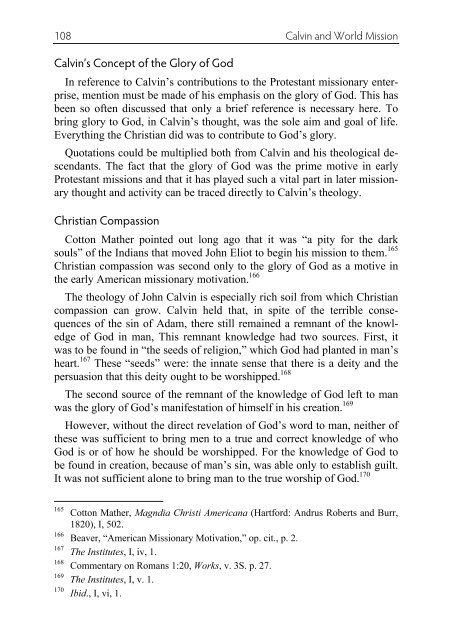Calvin and Missions - World Evangelical Alliance
Calvin and Missions - World Evangelical Alliance
Calvin and Missions - World Evangelical Alliance
You also want an ePaper? Increase the reach of your titles
YUMPU automatically turns print PDFs into web optimized ePapers that Google loves.
108 <strong>Calvin</strong> <strong>and</strong> <strong>World</strong> Mission<br />
<strong>Calvin</strong>’s Concept of the Glory of God<br />
In reference to <strong>Calvin</strong>’s contributions to the Protestant missionary enterprise,<br />
mention must be made of his emphasis on the glory of God. This has<br />
been so often discussed that only a brief reference is necessary here. To<br />
bring glory to God, in <strong>Calvin</strong>’s thought, was the sole aim <strong>and</strong> goal of life.<br />
Everything the Christian did was to contribute to God’s glory.<br />
Quotations could be multiplied both from <strong>Calvin</strong> <strong>and</strong> his theological descendants.<br />
The fact that the glory of God was the prime motive in early<br />
Protestant missions <strong>and</strong> that it has played such a vital part in later missionary<br />
thought <strong>and</strong> activity can be traced directly to <strong>Calvin</strong>’s theology.<br />
Christian Compassion<br />
Cotton Mather pointed out long ago that it was “a pity for the dark<br />
souls” of the Indians that moved John Eliot to begin his mission to them. 165<br />
Christian compassion was second only to the glory of God as a motive in<br />
the early American missionary motivation. 166<br />
The theology of John <strong>Calvin</strong> is especially rich soil from which Christian<br />
compassion can grow. <strong>Calvin</strong> held that, in spite of the terrible consequences<br />
of the sin of Adam, there still remained a remnant of the knowledge<br />
of God in man, This remnant knowledge had two sources. First, it<br />
was to be found in “the seeds of religion,” which God had planted in man’s<br />
heart. 167 These “seeds” were: the innate sense that there is a deity <strong>and</strong> the<br />
persuasion that this deity ought to be worshipped. 168<br />
The second source of the remnant of the knowledge of God left to man<br />
was the glory of God’s manifestation of himself in his creation. 169<br />
However, without the direct revelation of God’s word to man, neither of<br />
these was sufficient to bring men to a true <strong>and</strong> correct knowledge of who<br />
God is or of how he should be worshipped. For the knowledge of God to<br />
be found in creation, because of man’s sin, was able only to establish guilt.<br />
It was not sufficient alone to bring man to the true worship of God. 170<br />
165<br />
Cotton Mather, Magndia Christi Americana (Hartford: Andrus Roberts <strong>and</strong> Burr,<br />
1820), I, 502.<br />
166<br />
Beaver, “American Missionary Motivation,” op. cit., p. 2.<br />
167<br />
The Institutes, I, iv, 1.<br />
168<br />
Commentary on Romans 1:20, Works, v. 3S. p. 27.<br />
169 The Institutes, I, v. 1.<br />
170 Ibid., I, vi, 1.

















